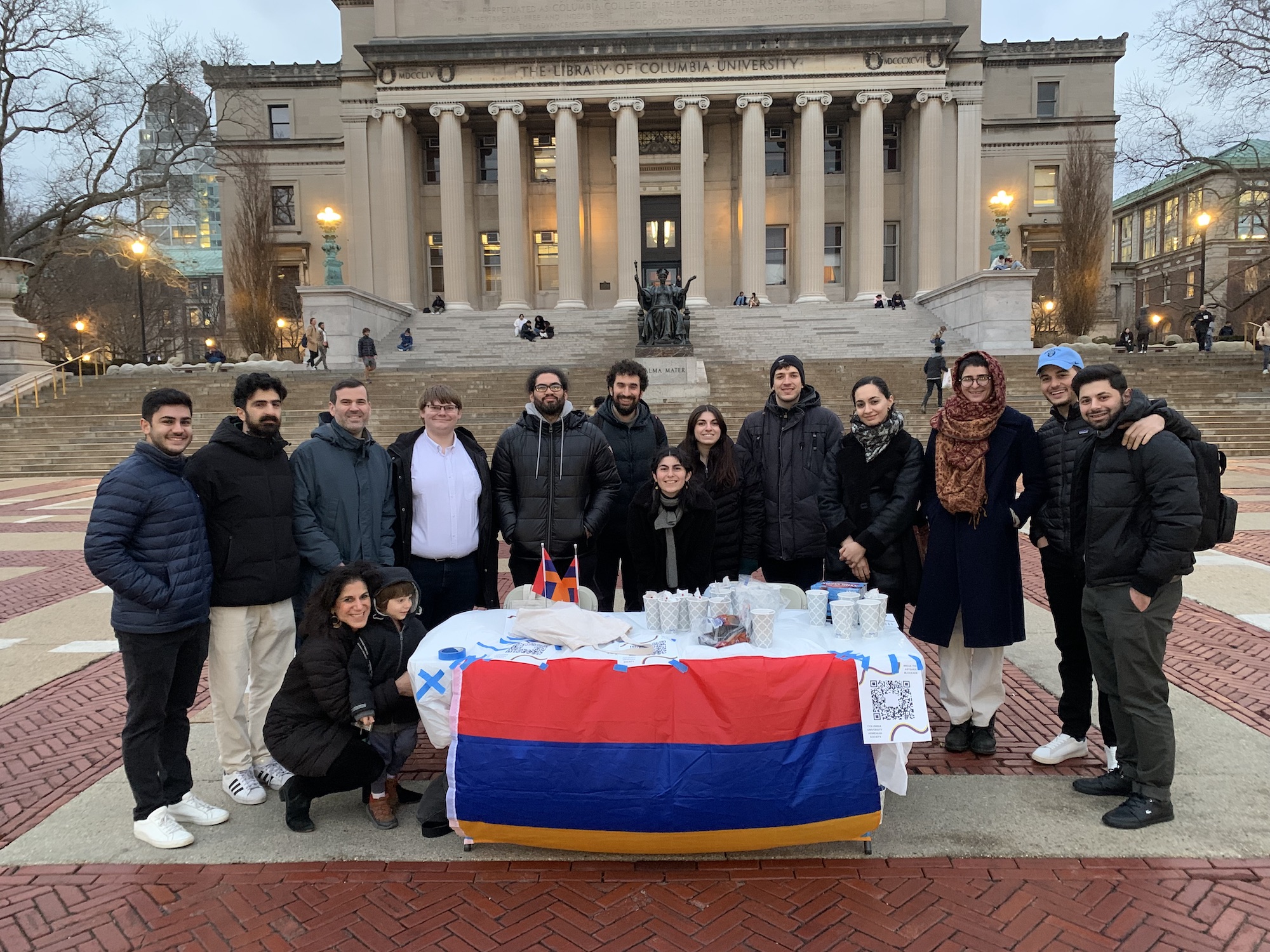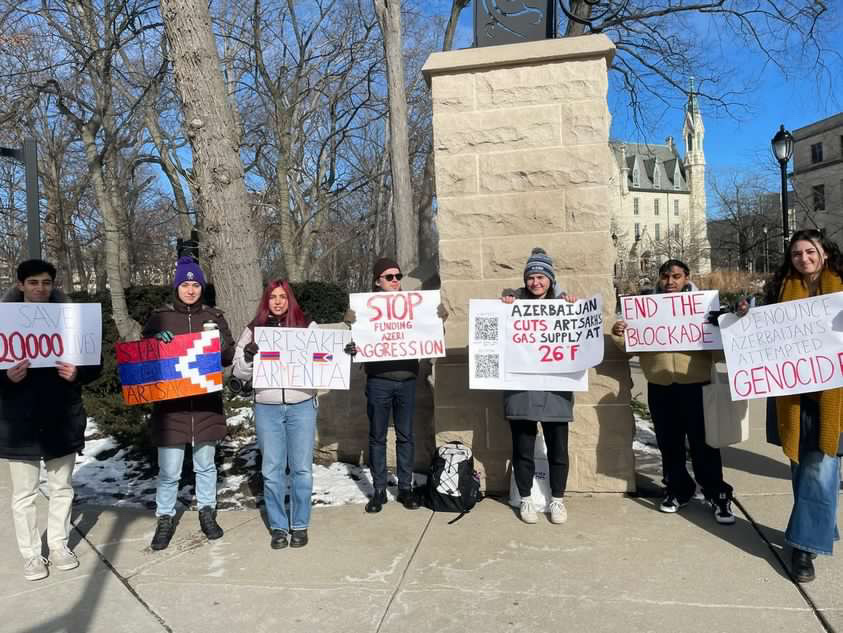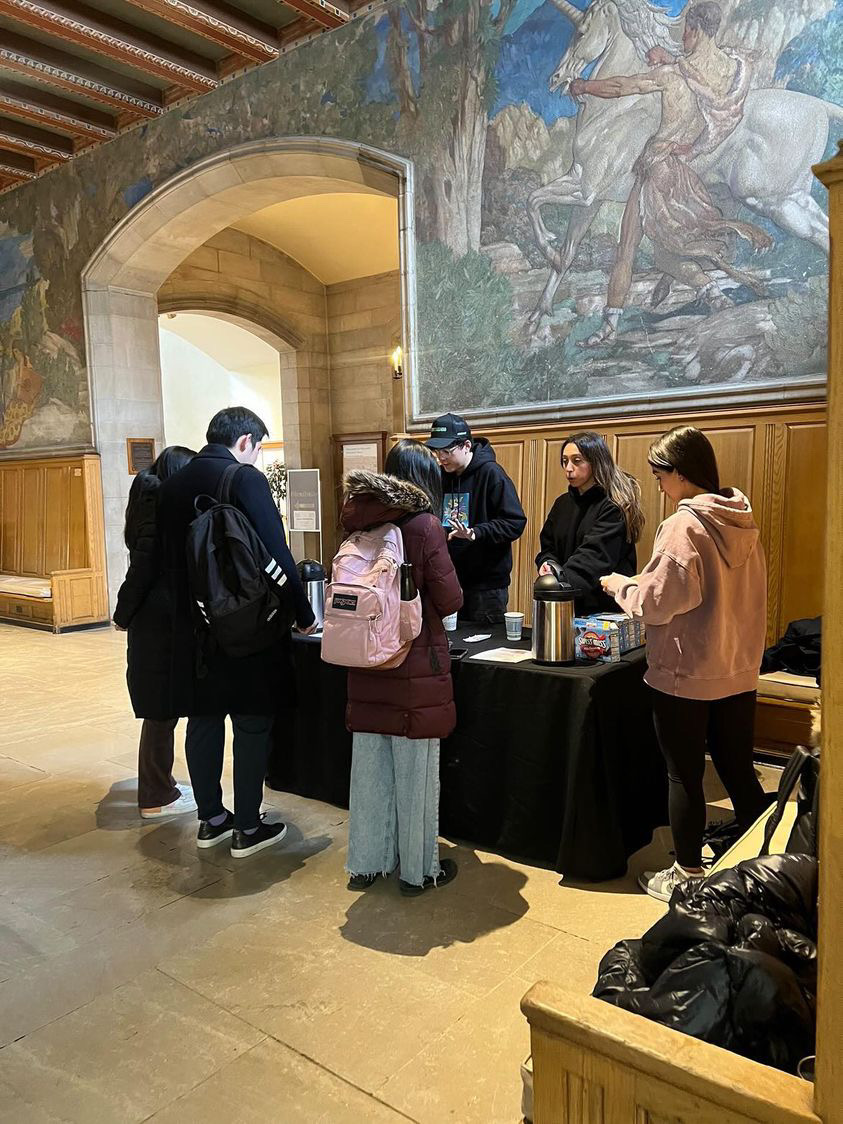
c/o Annie McGovern, Columbia
On Friday, February 3rd, Monday, February 6th, and Thursday, February 9th, students across the world protested the ongoing human rights violations committed by Azerbaijan towards ethnic Armenians in Nagorno Karabakh. Student representatives from Columbia, Cornell, GWU, Harvard, Princeton, Villanova, University of Buenos Aires, Imperial College London, London School of Economics, King’s College, and University College London participated in the events and publicly condemned the recent blockade of the Lachin Corridor.
Unfortunately, the decades-long conflict between Armenia and Azerbaijan over Nagorno Karabakh is rarely reported on by mainstream media or included in school curricula. Most Americans remain completely unaware of the current political situation.
On December 12th, 2022, Azerbaijanis posing as eco-activists imposed a blockade, accusing Armenians of transporting military hardware to Nagorno Karabakh and illegally mining for resources in the contested region. State officials in Armenia and Nagorno Karabakh dispute these claims and Azerbaijan has yet to provide substantial evidence. Radio Free Europe/Radio Liberty investigated the protestors and concluded that a majority of them have not historically identified as environmentalists. In reality, many of the participants are Aliyev supporters, military personnel, members of the Turkish nationalist group Grey Wolves, and more. Further, RFE/RL found that the Azerbaijani government provided the tents that the protestors sleep in.

c/o Annie McGovern, Northwestern
The Lachin Corridor comprises the main passageway linking Armenia to Nagorno Karabakh and is used to deliver hundreds of tons of food, medicine, fuel, and other essential goods to the residents of Nagorno Karabakh. The blockade has placed over 120,000 ethnic Armenians under siege for close to two months. Without their daily imports from Armenian proper, the residents of Nagorno Karabakh are suffering major food and medicine shortages. Businesses have closed, leaving thousands of Armenians unemployed, and markets remain empty. In addition, residents are experiencing sporadic disruptions to their power and energy lines, which lie in Azerbaijani territory. The government has started providing firewood and wood burning stoves so that residents can have a reliable source of heat and have shut down schools that lack energy supplies. These dire situations have exacerbated pre-existing health conditions, and without working hospitals and proper medical supplies, many patients’ health remains in danger. Patients in grave condition that require transfer to the larger hospital in Yerevan have been prevented from accessing life-saving treatment by the blockade. This has resulted in at least one death.

c/o Annie McGovern, Princeton
When the blockade was first instituted, Armenians were still recovering from the military operations that Azerbaijan launched on September 13th. The two-day attacks resulted in 207 Armenian soldiers dead, 293 Armenian soldiers wounded, 20 new prisoners of war, 7600 civilians displaced, and 3 civilians dead.
In addition to threatening Armenians physically, Azerbaijan has continuously engaged in hateful rhetoric, calling for the destruction of all Armenians and referring to them as parasites, dogs, savages, and terrorists. President of Azerbaijan, Ilham Aliyev, has publicly expressed his hatred of Armenians on countless occasions. In November 2020, he proudly declared:
“We did, we brought [the Armenians] to their knees, and they are on their knees now! There is hardly anyone [Pashinyan] didn’t call over the past 40 days, begging for help and humiliating himself. We have disgraced him, and we were absolutely right in doing so. When he danced drunk on Jidir Duzu in the sacred city of Shusha, he should have thought that this day would come. He would receive his punishment. Now he hides like a mouse as he takes this document and signs it in tears. We showed him his place. We taught him a lesson. We chased them out of our lands like dogs. I said that we would chase them, that we would chase them like dogs, and we chased them, we chased them like dogs. He is now signing this document out of fear, knowing that we will come to Aghdam, Kalbajar and Lachin. No-one can stop us. Everyone sees our strength; everyone understands what our iron fist is like.”

c/o Annie McGovern, Buenos Aires
The language Aliyev uses to describe and address the Armenian people has influenced colleagues, major media corporations, and everyday civilians. Other examples include:
Hajibala Abutalybov, former Deputy Prime Minister of Azerbaijan: “Our goal is the complete elimination of Armenians. You Nazis eliminated the Jews in the 1930s and 40s, right? You should be able to understand us.”
Habil Aliyev, Founder and Editor-in-Chief of Gundelik Baku Local Newspaper: “I consider the Armenians my eternal enemies. Wherever I see Armenians, I will cut their tongues off and will call them perverts. Even if I am torn into pieces, I will always hate them…If I go to war again, I will not pity even the Armenian children.”
Azerbaijani citizen, Facebook post: “We must drink the blood of these bastard Armenians, regardless of age and sex.”
American media and politics has neglected this crisis for far too long. The ethnic Armenian students and leaders from Armenian Student Associations (ASAs) on these 11 campuses therefore took it upon themselves to spread awareness within their respective communities. Columbia, GWU, Northwestern, University of Buenos Aires, and the London cohort held signs in public spaces on campus that advertised the devastating impacts of Azerbaijan’s actions. Villanova hosted a discussion on Azerbaijan’s recent violations of the trilateral peace agreement. Harvard Law and Cornell students stationed themselves at tables and engaged in dialogue with passersby. Princeton engaged in a week-long poster initiative to continue drawing attention to the issue. The participating schools all asked their attendees to sign a joint petition condemning Azerbaijan’s actions. They also shared organizations to donate to and ways to contact Congresspeople to urge them to take action.

c/o Annie McGovern, Cornell
The skirmishes in September and the current blockade both occurred in direct violation of the 2020 Trilateral Statement. Our protest strove to shed light on all the human rights abuses that Azerbaijan has committed against Armenians over the past two years, in addition to the innumerable violations they have perpetrated for decades. The events of the last few months have placed Armenians in danger. If not held accountable, Azerbaijan will continue engaging in such illegal and inhuman behavior.
This protest demonstrates that students across the world, the future leaders of America, are invested in this issue and watching to see how our current leaders react. International political figures, lawyers, and activists must act in accordance with their official duties and protect all Armenians from further atrocities. We ask our officials to join us in condemning the actions of Azerbaijan.
To sign our petition and learn more about the conflict and places to donate, visit https://linktr.ee/studentsforarmenia.
Annie McGovern graduated from Wesleyan University in 2022 with a degree in Psychology and Government. In the fall of her senior year, she was selected to participate in the undergraduate human rights advocacy training program led by the University Network of Human Rights. She was then assigned to a project investigating human rights abuses committed by Azerbaijan against Armenians living in Nagorno Karabakh. During spring break, she traveled to Armenia and assisted her supervisors in conducting interviews and gathering facts about the ongoing violations. Her team is currently writing a report on their findings and engaging in advocacy work. She can be reached at amcgovern@wesleyan.edu.
-
Janice Okoomian